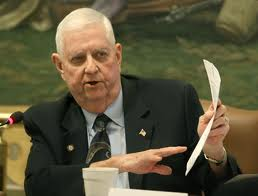Scores of economic tax credits and incentives will continue to be scrutinized this interim by a special House oversight committee.
House Speaker Kris Steele on Wednesday formed the bipartisan House Tax Credit and Economic Incentive Oversight Committee. The committee will hold multiple hearings between September and November in order to gauge the effectiveness of various economic tax credits and incentives.
“Tax credits that help create jobs and return more to the state than they cost are worthwhile, but many others amount to giveaways that provide no net benefit to the state. As fiscal conservatives, our focus remains on keeping the valuable tax credits that grow our economy while reforming or eliminating the rest,” said Steele, R-Shawnee.
Rep. David Dank, R-Oklahoma City, asked that the committee be formed and will serve as its chairman. The committee’s goal is to continue educating legislators about the effectiveness and ineffectiveness of economic tax incentives and to develop potential tax credit policy reforms for consideration next session.
Last interim, Dank served as chairman of a task force that developed several recommendations to improve state tax credit policy. Legislation enacting many of the recommendations of the Task Force for the Study of State Tax Credits and Economic Incentives passed the House last session, but stalled in the Senate.
“We fully intend to keep shining a light on these credits until the job is done,” Dank said. “The special oversight committee will continue to heighten our understanding of tax credits so legislators can make the best decisions possible for the taxpayers. Once you learn the truth about some of these credits, it becomes painfully obvious that more safeguards are needed to assure that every taxpayer dollar we invest yields real returns in the form of new jobs and greater prosperity – not just special deals for special interests.”
The committee will review economic tax credits and incentives claimed by business entities. It will not review personal tax credits or incentives claimed by individuals.
Dank said improving Oklahoma’s economic tax credit system will be critical if Oklahoma wants to responsibly reduce its personal income tax rate in the future.
“A primary reason legislators failed to agree on tax cuts for all 3.5 million Oklahomans last session was that they failed to address a widely-abused tax credit system that gives hundreds of millions each year to a favored few,” Dank said. “Step one to responsibly reducing the income tax is for the Legislature to saddle up and eliminate sweetheart tax giveaways. This special oversight committee will help move that process along.”
House Tax Credit and Economic Incentive Oversight Committee members are:
Rep. David Dank, R-Oklahoma City, chairman
Rep. Earl Sears, R-Bartlesville, vice-chairman
Rep. Jeff Hickman, R-Dacoma
Rep. Mike Jackson, R-Enid
Rep. Scott Martin, R-Norman
Rep. Marty Quinn, R-Claremore
Rep. Todd Thomsen, R-Ada
Rep. Harold Wright, R-Elk City
One Republican member TBD
Rep. Scott Inman, D-Del City
Rep. Jeannie McDaniel, D-Tulsa
Rep. Richard Morrissette, D-Oklahoma City
The Tax Credit and Economic Incentive Oversight Committee will not be a standing committee during session.




Tax credits = government social engineering. Stop trying to pick winners and losers, and playing at cronyism for the lobbyists and special interests. Treat everyone the same, with the lowest tax rate possible, spread across the most people possible. If the legislature doesn’t stop this, there will be other efforts – soon – to do so. Taking from one group via taxes and rewarding another via “credits” is legalized theft. Keep up the pressure, Rep. Dank. You’re doing a good job.
I can’t believe things such as this – relics of the era of democrats in this state – have not been eliminated by our “conservatives” in the legislative and executive branches. Stunning.